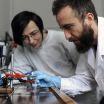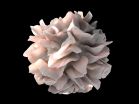NIH-funded researchers find off-patent antibiotics effectively combat MRSA skin infections
2015-03-19
(Press-News.org) Researchers funded by the National Institute of Allergy and Infectious Diseases (NIAID), part of the National Institutes of Health, have found that two common antibiotic treatments work equally well against bacterial skin infections caused by methicillin-resistant Staphylococcus aureus (MRSA) acquired outside of hospital settings. Known as community-associated MRSA, or CA-MRSA, these skin infections have been reported in athletes, daycare-age children, students, military personnel and prison inmates, among others, and can lead to hospitalization, surgical procedures, bacteria in the blood, and in severe cases, death.
Although MRSA is an increasingly common pathogen and the most common cause of skin infection in the United States, there is no standard treatment approach for CA-MRSA. As CA-MRSA emerged in community settings, there were concerns about how to identify the best treatment options and preserve the effectiveness of last-line drugs. Two older antibiotics that are no longer under patent, clindamycin and TMP-SMX, are recommended to treat CA-MRSA. It was unknown whether one antibiotic was associated with better outcomes in patients.
To answer this question, scientists tested clindamycin and TMP-SMX in adults and children with uncomplicated skin infections for 10 days. Of 466 study participants who received either antibiotic, the cure rate was 89.5 percent for clindamycin and 88.2 percent for TMP-SMX. The side effects of both drugs were comparable. The findings, which appear in the New England Journal of Medicine, suggest that uncomplicated skin infectious acquired outside of hospitals can be treated inexpensively and successfully with either drug, according to the researchers.
INFORMATION:
This project is one of multiple clinical trials NIAID began funding in 2007 aimed at identifying ways to reduce the risk of antimicrobial resistance by reducing and/or optimizing the use of licensed antibacterials. This study is being led by Dr. Henry F. Chambers of the University of California, San Francisco.
ARTICLE:
LG Miller et al. Clindamycin versus Co-trimoxazole for Uncomplicated Skin Infections. New England Journal of Medicine DOI: 10.1056/NEJMoa1403789 (2015).
WHO:
NIAID Director Anthony S. Fauci, M.D., and Dennis Dixon, M.D., chief of the Bacteriology and Mycology Branch (BMB) in NIAID's Division of Microbiology and Infectious Diseases, are available to comment on this study.
CONTACT:
To schedule interviews, please contact Emily Mullin, (301) 402-1663, niaidnews@niaid.nih.gov.
NIAID conducts and supports research--at NIH, throughout the United States, and worldwide--to study the causes of infectious and immune-mediated diseases, and to develop better means of preventing, diagnosing and treating these illnesses. News releases, fact sheets and other NIAID-related materials are available on the NIAID website.
About the National Institutes of Health (NIH): NIH, the nation's medical research agency, includes 27 Institutes and Centers and is a component of the U.S. Department of Health and Human Services. NIH is the primary federal agency conducting and supporting basic, clinical, and translational medical research, and is investigating the causes, treatments, and cures for both common and rare diseases. For more information about NIH and its programs, visit http://www.nih.gov.
NIH...Turning Discovery Into Health®
ELSE PRESS RELEASES FROM THIS DATE:
2015-03-19
Nanoparticles of various types can be quickly and permanently bonded to a solid substrate, if one of the most effective methods of synthesis, click chemistry, is used for this purpose. The novel method has been presented by a team of researchers from the Institute of Physical Chemistry of the Polish Academy of Sciences, Warsaw, Poland.
A small movement of the hand, the characteristic 'click!' - and the snap fastener quickly and securely fastens our clothes. One of the newest methods of synthesis in modern chemistry, click chemistry, works on a similar basis. Here, molecules ...
2015-03-19
Clear and realistic expectations are key to successfully hiring heads of departments, say Professor Pierre-Alain Clavien, University of Zurich, and Joseph Deiss, former President of the Swiss Confederation, in a commentary in Nature magazine.
Selecting a chair for a position in clinical academic medicine is often problematic, with the diverse demands placed on the position proving a constant source of debate. Today's heads of departments are not only expected to be outstanding physicians, researchers, and teachers, but also adroit and cost-conscious managers. Finding ...
2015-03-19
A pioneering class of drugs that target cancers with mutations in the BRCA breast cancer genes could also work against tumours with another type of genetic fault, a new study suggests.
Scientists at The Institute of Cancer Research, London, found that errors in a gene called CLBC leave cancer cells vulnerable to PARP inhibitor drugs. Around 2 per cent of all tumours have defects in CLBC.
The study, which was carried out in collaboration with colleagues in Denmark and the Czech Republic, was funded in the UK by the European Union, and was published today (Thursday) in ...
2015-03-19
Are humans born with the ability to solve problems or is it something we learn along the way? A research group at the Department of Physics and Astronomy, Aarhus University, is working to find answers to this question.
The research group has developed a computer game called Quantum Moves, which has been played 400,000 times by ordinary people. This has provided unique and deep insight into the human brain's ability to solve problems. The game involves moving atoms around on the screen and scoring points by finding the best way to do so.
In this way, ordinary people ...
2015-03-19
Scientists at the University of Cambridge have successfully created 'mini-lungs' using stem cells derived from skin cells of patients with cystic fibrosis, and have shown that these can be used to test potential new drugs for this debilitating lung disease.
The research is one of a number of studies that have used stem cells - the body's master cells - to grow 'organoids', 3D clusters of cells that mimic the behaviour and function of specific organs within the body. Other recent examples have been 'mini-brains' to study Alzheimer's disease and 'mini-livers' to model ...
2015-03-19
Women who received a text message reminding them about their breast cancer screening appointment were 20 per cent more likely to attend than those who were not texted, according to a study published in the British Journal of Cancer today (Thursday)*.
Researchers, funded by the Imperial College Healthcare Charity, trialled text message reminders for women aged 47-53 years old who were invited for their first appointment for breast cancer screening.
The team compared around 450 women who were sent a text with 435 women who were not texted**. It found that 72 per cent ...
2015-03-19
PISCATAWAY, N.J. (March 18, 2015) - New research published by Rutgers University chemists has documented significant progress confronting one of the main challenges inhibiting widespread utilization of sustainable power: Creating a cost-effective process to store energy so it can be used later.
"We have developed a compound, Ni5P4 (nickel-5 phosphide-4), that has the potential to replace platinum in two types of electrochemical cells: electrolyzers that make hydrogen by splitting water through hydrogen evolution reaction (HER) powered by electrical energy, and fuel cells ...
2015-03-19
The number of people living with cystic fibrosis into adulthood in the UK is expected to increase dramatically - by as much as 80 per cent - by 2025, according to a Europe-wide survey, the UK end of which was led by Queen's University Belfast.
People living with cystic fibrosis have previously had low life expectancy, but improvements in treatments in the last three decades have led to an increase in survival with almost all children now living to around 40 years. In countries where reliable data exists, the average rise in the number of adults with CF is expected to be ...
2015-03-19
A recent study published in the Journal of the American Academy of Child and Adolescent Psychiatry reports that following military parents' return from combat deployment, their children show increased visits for mental healthcare, physical injury, and child maltreatment consults, compared to children whose parents have not been deployed. The same types of healthcare visits were also found to be significantly higher for children of combat-injured parents.
Children of deployed parents are known to have increased mental healthcare needs, and be at increased risk for child ...
2015-03-19
When cancer strikes, it may be possible for patients to fight back with their own defenses, using a strategy known as immunotherapy. According to a new study published in Nature, researchers have found a way to enhance the effects of this therapeutic approach in glioblastoma, a deadly type of brain cancer, and possibly improve patient outcomes. The research was funded by the National Institute of Neurological Disorders and Stroke (NINDS) as well as the National Cancer Institute (NCI), which are part of the National Institutes of Health.
"The promise of dendritic cell-based ...
LAST 30 PRESS RELEASES:
[Press-News.org] NIH-funded researchers find off-patent antibiotics effectively combat MRSA skin infections


